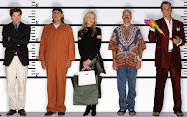
The other night, I watched Martin McDonagh's In Bruges, and it was far better than I imagined. When I saw the trailer, I had assumed it was a chase-'em and kill-'em flick and that the trailer contained all of the available comedic moments of the movie. I was completely wrong on both accounts. Primarily, the film is about acceptance and redemption - wanting redemption and accepting that you won't get it, finding redemption through an acceptance of past actions. This is an ironic film with comedic layers on a serious foundation. The plot is quite serious. We follow Ray (Colin Farrell, who I normally dislike but absolutely loved here), who is hiding out in Bruges after killing a priest. His boss, Harry Waters (a rather creepy-looking Ralph Fiennes), has put him up in Bruges with another hitman, Ken (played so wonderfully by Brendan Gleeson) because he thinks Bruges is like a fairy-tale. Ray, however, hates Bruges and thinks it's actually more like hell, constantly adding "Fucking" as a prefix to the city's name. The film finds humor - in, honestly, every single scene - because Ray really hates Bruges. He also has an odd obsession with midgets (and their suicidal tendencies), and he tends to get into fights with people for no reason at all. In one scene, he beats up a Canadian, thinking he's actually American, and says, "That's for John Lennon." It's such an odd thing to say, but unexpected things are often funny. (It's why we sometimes laugh after scary moments in movies and why we never laugh at America's Funniest Home Videos). It's not until later you realize he said that referring to Lennon's murder, not his actual existence. Really, who could hate John Lennon? Well, Ray does hate Bruges, so...
But, unlike my assumptions from the trailer, there was no big chase scene. There was a chase scene, but it lasted maybe five minutes, and even then, the time was condensed. McDonagh knew that the film was not about Harry Waters or his quest to kill Ray. This was Ray's story. Killing the priest was Ray's first job, and, due to unfortunate events, he accidentally killed another person, a child. Racked with guilt, Ray is suicidal and faces every moment of his life like he has nothing to lose. And really, he has nothing. Even to himself, he's dead. Ray is not seeking redemption for his actions; he's seeking acceptance. Every day, every moment, Ray can't understand why things unfolded as they did. He doesn't expect to be redeemed because he cannot even accept what he did.

But, for me, Farrell does not carry this film. This film is really about Ken. Gleeson is superb in his subtle role. Also a hitman (who has done multiple jobs and has a strong connection/kinship with his boss Harry), Ken loves Bruges and is a complete tourist. When Ray gets cabin fever, Ken only lets him out of the room when he wants to do touristy things (which, trust me, as someone who would rather go to a museum than a pub, this scene is really funny because of its realism). They go to a museum and look at some Bosch, which, for any art history major, is an utter delight. Blatant display of the thematic message! Redemption! Hell! Judgement Day! Umm... Hell! Ken contemplates the painting in an almost zen-like manner, and he explains the concept of Judgement Day to Ray, who looks a combination of disgusted, terrified, and certain of how he would be judged. Ken's personality doesn't change during the film, which I thought was really interesting. Normally films with multiple lead characters all experience a character alteration (because if they don't change, what can the audience learn from them?). Ken stays the same because he has years of experience under his belt, and he has already come to accept his actions, and he finds redemption through this acceptance.
Throughout the movie, Ken is calm and normal, which offsets the twitchy and spastic Ray quite nicely. Harry comes in and causes some trouble, and the ending moments of the film are perfect. Endings of movies tend to disappoint me, even if I love the rest of the movie. But this ending completed the movie; it made sense of the connections between acceptance and redemption. Everything was set up in a way that I figured out the ending before it happened, but the ending wasn't supposed to be a surprise, so I can't really brag about my intelligence. This film isn't about a chase. I may have figured out the plot, but I didn't figure out the characters until long after the movie ended.

And let's not forget the fourth character in the film... BRUGES. I visited Bruges a few years ago and loved it. It's known as the Venice of the North, but other than a canal, it doesn't have much in common with Venice. (Although, it rained the majority of the time I spent in both cities, but I digress.) The houses are absolutely charming, and you're amazed that they even have electricity. It really is like taking a step through time, or perhaps into a fairy-tale. The location shots in the movie were extremely well done, especially the scene in the Basilica of the Holy Blood, where Ken steps in line to touch an encased cloth with Jesus' blood. (I did that!)
I don't consider myself to be easily impressed, and perhaps it's been a long time since I've seen a movie that I truly connected with on an emotional and intellectual level... but this film was amazing. If I had a rating system, I would give it 4.75 Awesomes out of 5.









.jpg)


No comments:
Post a Comment